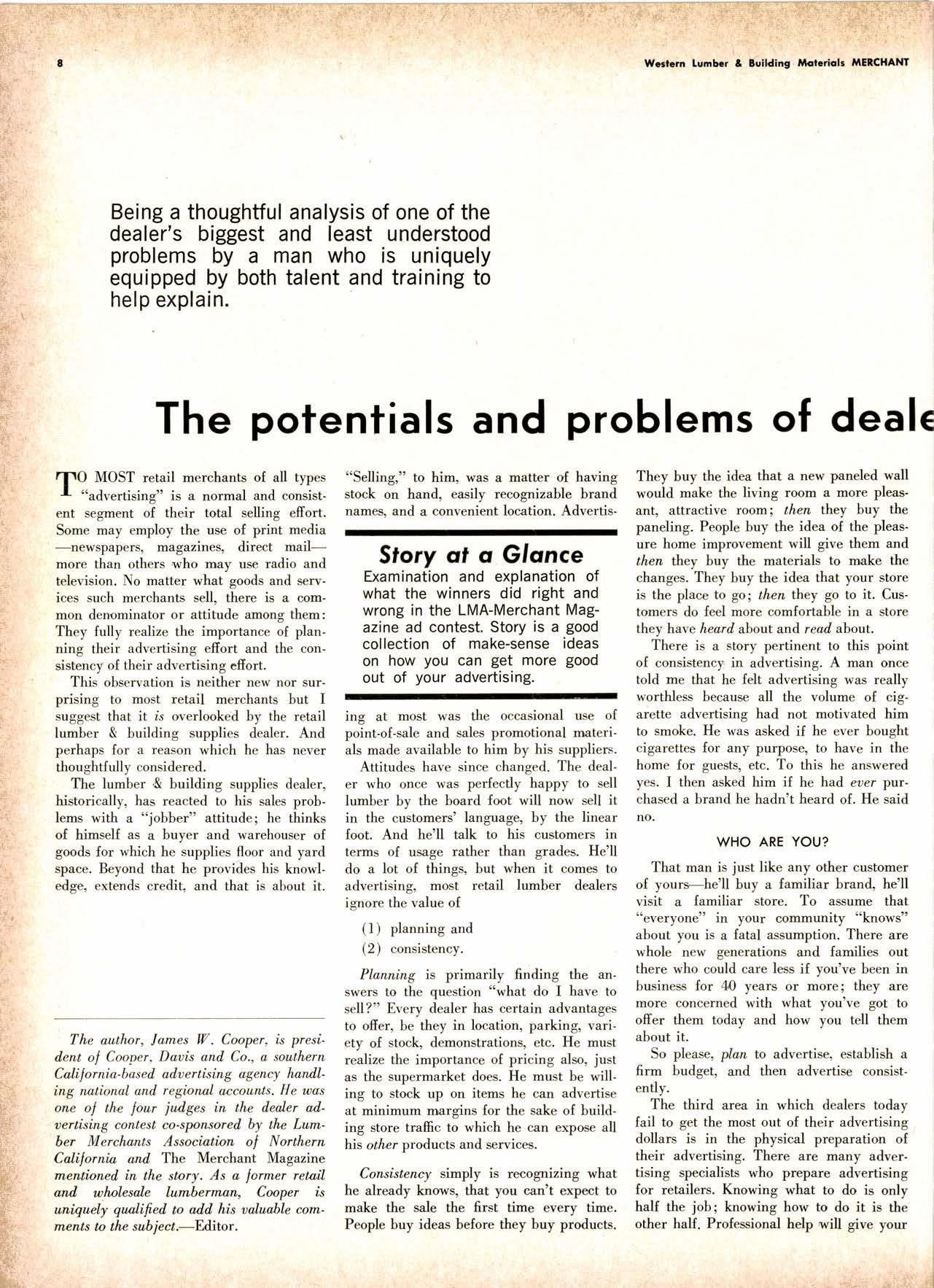
3 minute read
The potentials and problems of deald
rlo MOST retail merchants of all types r toadvertisins" is a normal and consistent segment oI their total selling effort. Some may employ the use of print media -newspapers, magazines, direct mailmore than others 'ruho may use radio and television. No matter what goods and services such merchants sell, there is a common denominator or attitude among them: They fully realize the importance of planning their advertising effort and the consistency of their advertising efiort.
This observation is neither new nor surprising to most retail merchants but I suggest that it is overlooked by the retail lumber & building supplies dealer. And perhaps for a reason which he has never thoughtfully considered.
The lumber & building supplies dealer, historically, has reacted to his sales problems with a "jobber" attitude; he thinks of himself as a buyer and warehouser of goods for which he supplies floor and yard space. Beyond that he provides his knowl. edge, extends credit, and that is about it.
"Selling," to him, was a matter of having stock on hand, easily recognizable brand names, and a convenient location. Advertis-
Slory of o Glonce
Examination and explanation of what the winners did right and wrong in the LMA-Merchant Magazine ad contest. Story is a good collection of make-sense ideas on how you can get more good out of your advertising.
ing at most was the occasional use of point-of-sale and sales promotional materials made available to him by his suppliers.
Attitudes have since changed. The dealer who once was perfectly h.ppy to sell lumber by the board foot will now sell it in the customers' languagg by the linear foot. And he'll talk to his customers in terms of usage rather than grades. He'll do a lot of things, but when it comes to advertising, most retail .lumber dealers ignore the value of
(l) planning and
(2) consistency.
The author, tames W. Cooper, is presid,ent ol Coooer, Daois anil Co., a southern California-baseil aduertising agency hand,ling na.tional and reginuil atcounts. He was one ol the lour judges in the dealer ad,aertising contest co-sponsoreil by the Lum,ber Merchants Association ol Northern Colilornia anil The Merchant Magazine mentioned, in the story, As o lonner retail and, wholesaJe lurnbermnn, Coopens uni4uety qualified to add his aaluable cornnxents to thc subject.-Editor.
Planning is primarily finding the answers to the question oowhat do I have to sell?" Every dealer has certain advantages to ofier, be they in location, parking variety of stock, demonstrations, etc. He must realize the importance of pricing also, just as the supermarket does. He must be willing to stock up on items he can advertise at minimum rnargins for tlle sake of building store traffic to which he can expose all his othcr products and services.
Consistency simply is recognizing what he already knows, that you can't expect to make the sale the first time every time. People buy ideas before they buy products.
They buy the idea that a new paneled wall would make the living room a more pleasant, attractive room; then they buy the paneling. People buy the idea of the pleasure home improvement will give them and then they buy the materials to rnake the changes. They buy the idea that your store is the place to go; then they go to it. Customers do feel more comfortable in a store they have hearil ahout and read about. There is a story pertinent to this point of consistency in advertising. A man once told me that he felt advertising was really worthless because all the volume of cigarette advertising had not motivated him to smoke. He was asked if he ever bought cigarettes for any purpose, to have in the home for guests, etc. To this he answered yes. I then asked him if he had eaer plurchased a brand he hadn't heard of. He said no.
WHO ARE YOU?
That man is just like any other customer of yours--he'll buy a familiar brand, he'll visit a familiar store. To assume that "everyone" in your community ooknows" about you is a fatal assumption. There are whole new generations and families out there who could care less if you've been in business for 4O years or more; they are more concerned with what you've got to offer them today and how you tell them about it.
So please, plan to advertise, establish a firm budget, and then advertise consistently.
The third area in which dealers today fail to get the most out of their advertising dollars is in the physical preparation of their advertising. There are many advertising specialists who prepare advertising for retailers. Knowing what to do is only half the job; knowing how to do it is the other half. Professional help will glve your

